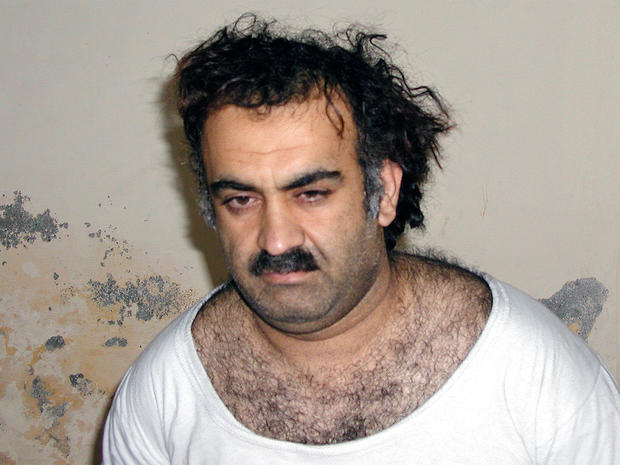Renewed Gitmo trial brings Khalid Sheikh Mohammed back in view
(CBS News) In one way, the renewed military trial of the acknowledged mastermind of the Sept. 11 terror attacks and four others is a bit of Kabuki theater. Everyone knows the charges. Khalid Sheikh Mohammed and Ramzi Binalshib have admitted to, even reveled in, their roles as principal planners the attacks.
In another way, it is a bit of a high-wire act - the military commission system is one that hadn't been used since the 1940s to execute Nazi spies who came in from a German submarine off Montauk Point in New York. In the few cases from the post-9/11 battlefields, it has been clunky.
When I was with the FBI, I traveled to Guantanamo Bay and saw the military commission system at work. I was a witness at the trial of Salim Hamdan, Osama bin Laden's bodyguard and driver. After being held for seven years, Hamdan was convicted and sentenced to time served, plus six months. At the same time, back in the civilian federal court system, people who were being convicted of material support of terrorism charges far more benign than being on bin Laden's personal security detail were receiving longer sentences. In one case, two men convicted of sending blankets and backpacks to the Mujahedeen were being sentenced more than 10 years in federal prison.
Sept. 11 trial to resume at Guantanamo
Among the issues that will complicate the military commissions will be how evidence was obtained - what role waterboarding and other techniques played in getting statements and even whether statements obtained later without "enhanced methods of interrogation" were influenced by the suspect having been tortured previously.
In the case of the 9/11 suspects, there is another interesting question, assuming they are convicted. Does the court sentence them to life or death? By giving Mohammed his wish to become a "martyr", does the U.S. play into the hands of the 9/11 mastermind by making him a symbol for others to follow or even avenge? On the other hand, if you sentence him to life in federal prison, does he become some kind of collateral? Will terrorists who hijack planes or hold hostages demand his release?
In either case, Mohammed may be satisfied. He is, in many ways, an attention junkie. His time in Guantanamo did little to blunt this. After meeting with the Red Cross for the first time since his capture in 2003, Mohammed was less interested in talking about waterboarding or the conditions of his captivity than he was with getting a picture taken with a more proper, longer beard. The fact that the photo released after his arrest showed him in a dirty T-shirt with mussed hair was driving him crazy. The man who wanted to be known for the plot that left nearly 3,000 innocent people dead found the arrest photo undignified.
Mohammed is a man of great ego and strong contradictions. As far back as 1993, he was connected to the first bombing of the World Trade Center, which was masterminded by his cousin Ramzi Yousef. Mohammed was born in Kuwait but learned English and attended Chowan College in North Carolina. In 1994, Mohammed was with Yousef and the two others in Manila where they were engaged in a number of plots: to kill Pope John Paul II on his 1995 visit to the Philippines; to down a dozen airliners over the Pacific using bombs made from Casio watches and nitro glycerin in cologne bottles; and even crash a jet into the CIA. Two were caught, but Mohammed and Yousef got away.
This is where the contradictions surface. While planning carnage in the name of Shariah law, Mohammed and his cousin were regulars in the Manila strip clubs. Mohammed once tried to woo a dental hygienist he had a crush on by using money that was supposed to be for terrorism to hire a helicopter and fly by the window of the office she worked in.
Mohammed was lucky too. Even when Yousef was captured at a Pakistani guest house for the bombing of the World Trade Center, Mohammed was coming down the street, saw the Americans moving in, and walked away. He would find his way from Pakistan into Afghanistan, where he would take the unfinished plots he designed with his cousin, update them and convince bin Laden to pay for them. One of them would be called, "The Planes Plot." It would be executed on Sept. 11, 2001.

